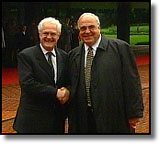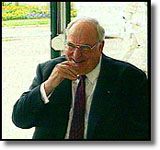
|
|
Jospin: Mission to persuade Kohl that EMU can begin on time
|
Kohl and Jospin Try to Dispel EMU Doubts
The German Chancellor Helmut Kohl, and the French Prime Minister Lionel Jospin have tried to dispel
speculation about differences in their approach to launching a stable single European currency on time.
"Germany and France stand unconditionally by the agreements already made and will do everything to fulfil the conditions for the introduction of the Euro," said a German government
statement released after the leaders held talks in Bonn.
Mr Jospin was given military honours for his first visit to Bonn since taking office in June. But behind the pomp and ceremony are disagreements about which nations should be allowed to join the single currency and how future economic policy should be conducted.
Both France and Germany want monetary union to begin on schedule in 1999, but some German politicians say the start should be delayed if the French government fails to reduce its deficit.

|
|
Chancellor Kohl: urging budgetary discipline
|
A meeting between the two sides in Poitiers in June, shortly after the election of Mr Jospin's socialist government, was somewhat cool.
While Chancellor Kohl has been trying to ensure that Germany and other EMU candidates adhere to strict budgetary discipline, Mr Jospin came to power promising job creation and anti-austerity measures. Both France and Germany are suffering from record unemployment.
After their Bonn meeting both leaders were keen to show a common line on the introduction of the new currency on January 1, 1999. They agreed that "the introduction of a stable euro according to the timetable in the Maastricht Treaty and with strict adherence to the stability criteria is indispensable
for the future of Europe", the statement said.

|
|
Germans queue outside an unemployment office
|
On Thursday, the influential German business daily Handelsblatt commented: "If there were doubts about the European commitment of the new French government, these must now be viewed as settled."
The paper added that the French Finance Minister, Dominique Strauss-Kahn, was following a course which made clear France's commitment to cut its budget deficit in order to meet the criteria for joining the currency.
There are other difficulties between France and Germany that the Prime Minister and the Chancellor are likely to address. In particular, they disagree about how the proposed European central bank should set continent-wide interest rates after 1999. The French are worried that too much emphasis will be put on fighting inflation and not enough on creating economic growth.

|



